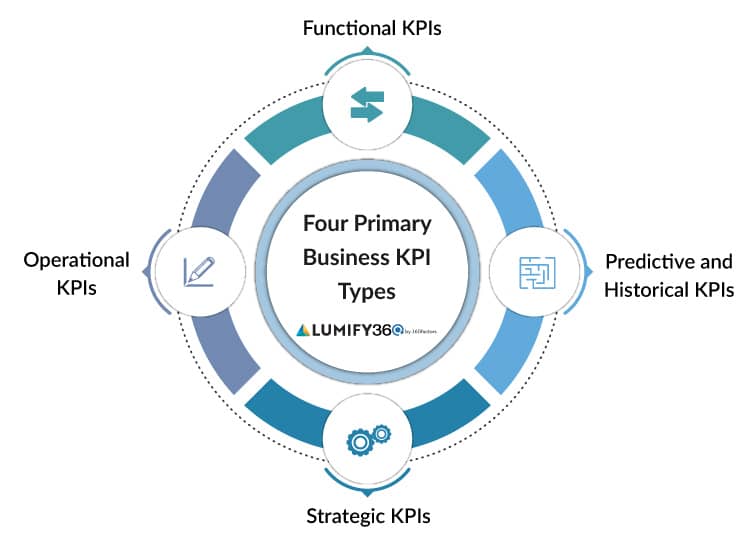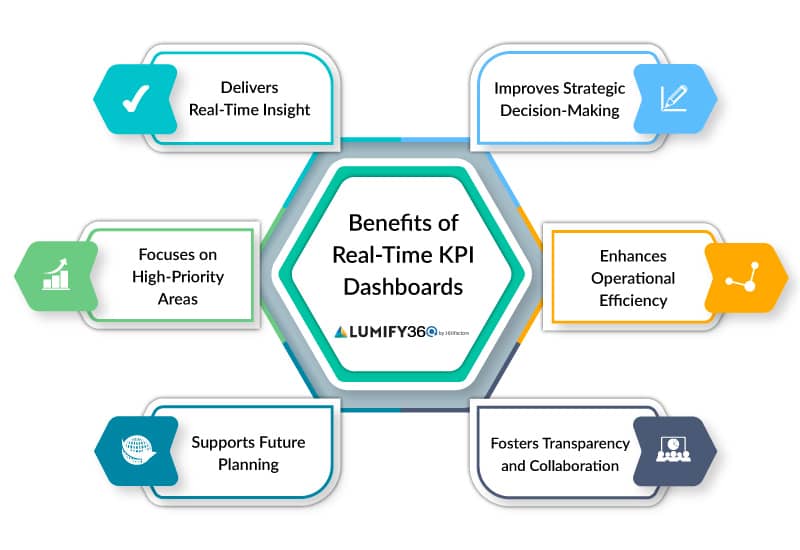Data is undeniably king in this competitive business landscape, and keeping track of critical key performance indicators (KPIs) is paramount to achieving company goals with the guidance of strategic decisions. Let us first discuss what is KPI dashboard:
A real-time KPI dashboard is an advanced tool that presents up-to-date, the minute view of different performances in a single, centralized, and intuitive interface. By continuously updating performance metrics, it allows business leaders to monitor the organization’s progress, detect trends and respond to changes instantly. The real time KPI dashboard empowers organizations to make informed and proactive decisions, crucial for sustaining a competitive edge.
A real-time KPI dashboard goes beyond historical data analysis. Rather, it offers a visual narrative showing how a company performs to meet its strategic goals. It enables leaders to make informed, swift decisions by converting the raw data into actionable insights, highlighting potential problems before materialization. It also ensures that all teams are on the same page by working harmoniously towards the company’s objectives. Whether you want to track sales growth, enhance customer satisfaction, or optimize the operational process, a well-constructed KPI dashboard is your answer. In this blog, we will walk through the main types of KPIs, along with how real-time KPI dashboards empower business leaders:

Four Primary Business KPI Types
Functional KPIs: Measuring Departmental and Team-Specific Performance
Functional KPIs assess the performance of teams, departments, and/or different organizational units. These metrics offer a comprehensive view of how business segments operate and their effectiveness in achieving organizational goals. For instance, a marketing team may evaluate the success of a campaign via KPIs, including customer acquisition costs, conversion rates, and ROI. HR professionals monitor performance by tracking recruitment efficiency and turnover rates.
Predictive and Historical KPIs: Balancing Forward-Looking Insights with Retrospective Analysis
Predictive and historical KPIs combine insights from past data with projections of future outcomes. Historical Key performance indicators offer a retrospective view, enabling companies to analyze the performance of prior efforts, such as historical financial performance. Comparatively, predictive KPIs evaluate current and historical data along with other factors, such as risks and risk thresholds, and external market data to predict future performance. Metrics in real-time KPI dashboards may include anticipated product demand, projected revenue, and expected market share.
Strategic KPIs: Guiding Long-Term Goals and Organizational Vision
Strategic KPIs are executive metrics correlating business performance to an organization’s long-term goals and objectives. Such metrics include profitability, market expansion and coverage, and customer success. By continuously monitoring these KPIs, leaders make informed decisions that shape the company’s future.
Operational KPIs: Optimizing Daily Processes for Business Efficiency
On the other hand, operational KPIs are associated with day-to-day functioning and focus on the efficiency and effectiveness of the processes. Examples of operational KPIs involve order fulfillment rates and production efficiency. These indicators provide an instant view to managers regarding the performance of operational aspects to make quick adjustments to enhance productivity.

Benefits of Real-Time KPI Dashboards
Improves Strategic Decision-Making
Real-time KPI dashboards provide business leaders with access to crucial information that empowers leaders to make quick and informed decisions, detect trends as they develop, and seize opportunities before competitors. This is crucial for sustaining an organization’s competitive advantage in the highly competitive markets.
Enhances Operational Efficiency
Operational efficiency is the lifeblood of a successful enterprise, and a real-time KPI dashboard plays a significant role in optimizing daily operations. By gathering, consolidating, and transforming data using automation, managers to track essential operational KPIs, including order processing times, production rates, and so on, and deal with inefficiencies instantly versus manual data collection.
Fosters Transparency and Collaboration
Another essential advantage of a real-time KPI dashboard is its ability to enhance organizational collaboration and transparency. By making critical performance data accessible to all appropriate stakeholders, such dashboards break down the silos between teams and departments. Having the same data metrics enhances transparency, fostering a more collaborative problem-solving and decision-making approach.
Supports Future Planning
A KPI dashboard is an invaluable tool for supporting future planning. It shows the latest data, empowering businesses to forecast trends and prepare accordingly. Professionals can harness these insights to set realistic objectives, evaluate potential outcomes, and formulate strategies. For example, when a real-time KPI dashboard shows a surge in customer demand, an organization may expand its production to fulfill future orders.
Focuses on High-Priority Initiatives
An effective KPI dashboard enables leaders to focus on high-priority initiatives by surfacing those metrics that are crucial to organizational success. By filtering out lower-priority data, the dashboard ensures that decision-makers focus on the areas where they can positively influence the most. For instance, the dashboard can prioritize market penetration and sales performance metrics by imaging an organization during a vital product launch.
Delivers Real-Time Insights
Real-time access to data is no longer a luxury anymore; it is a necessity. Real-time KPI dashboard live feed KPIs, enabling organizations to react rapidly to changes. Real-time insights strengthen businesses to make more informed decisions at the right time while remaining responsive and agile in dynamic environments.
Unlock the Power of Your Data with Business Data Analytics to Optimize KPIs
Leveraging the power of data analytics is essential for optimizing Key performance indicators (KPIs) and driving business success. Lumify360, a modern business data analytics platform, transforms how mid-market business executives manage and interpret their data. It helps leaders make critical decisions quickly and confidently by forecasting KPIs via real-time KPI dashboards. This platform excels at breaking down data silos and transforming unstructured data into actionable and real-time data. By integrating external market data, Lumify360 enriches these insights, providing a comprehensive view of the business landscape beyond internal metrics.
